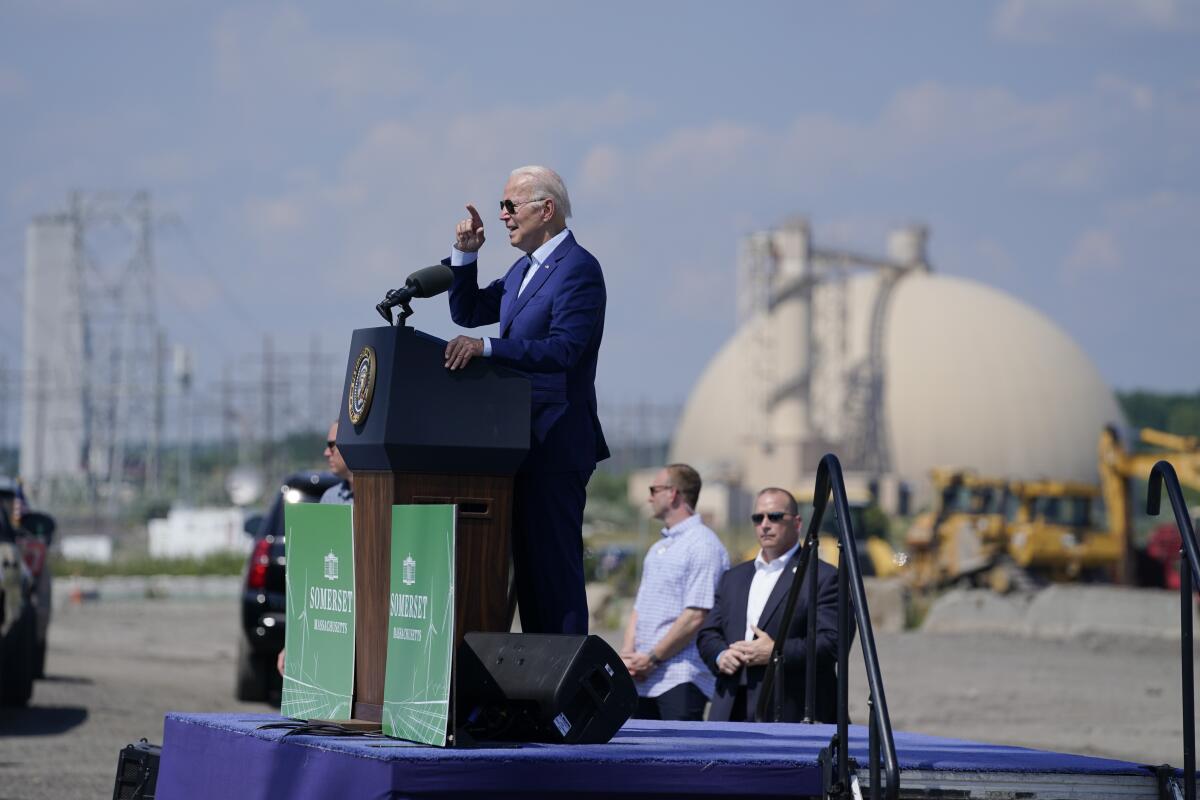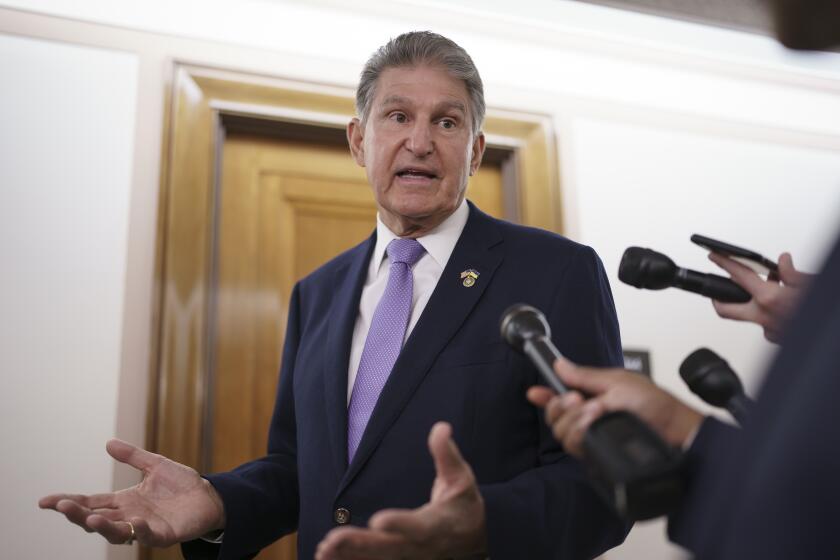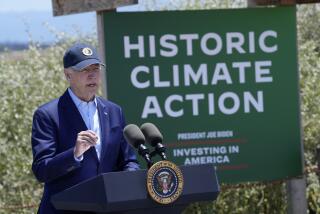Editorial: Climate change is an emergency. Biden should use his executive powers to do more

Last week’s unexpected Senate deal on a $369-billion climate spending package is bound to ease pressure on President Biden. Days earlier, when it looked like opposition from West Virginia Sen. Joe Manchin III had killed Biden’s climate agenda, the president vowed to take “strong executive action” if the Senate would not act.
Facing increasing calls from activists to break the glass and declare a national climate emergency, Biden said in a speech on July 20 that “climate change is an emergency. And in the coming weeks, I’m going to use the power I have as president to turn these words into formal, official government actions.”
That was before the breakthrough with Manchin. With congressional action now looking more likely, will Biden’s promise to confront the climate crisis with presidential proclamations, executive orders and regulatory power go unfulfilled?
Let’s hope not. Of course, we don’t need the president to tell us the overheating climate is an emergency; our planet is making the effects of our pollution loud and clear, hitting us with severe drought, deadly heat waves, devastating wildfires and flooding. The threat now is so dire that we need Biden to deliver on his pledge. That means using every executive and administrative power legally available to him to protect Americans from climate-fueled disasters, boost renewable energy and shift away from fossil fuels. And because declaring a national emergency would unlock additional tools and resources, he should do it.
The reversal, just weeks after Sen. Joe Manchin shot down similar legislation, is a ray of hope after years of inaction.
Yes, the Inflation Reduction Act agreed to by Manchin and Senate Majority Leader Charles E. Schumer (D-N.Y.) would be the biggest climate action ever taken by Congress. But the bar is low, because Congress has never passed significant climate legislation, despite more than three decades of warnings about the perils of inaction. Signing it into law will only get us part of the way to Biden’s goal of slashing U.S. greenhouse gas emissions in half by 2030, leaving our nation’s pledge under the Paris climate agreement out of reach without more action by his administration.
Dozens of national emergencies have been declared since the 1970s and used against an array of threats, including weapons of mass destruction, terrorism, disaster and disease, and some remain in effect decades later. They’ve been declared by President George W. Bush in 2001 after the 9/11 attacks and in response to Hurricane Katrina in 2005, by President Trump in 2020 against the COVID-19 pandemic and, controversially, in 2019 to divert funding for a wall along the U.S.-Mexico border.
But unlike Trump’s misuse of that authority for his wall, there is actually a legitimate legal basis for calling climate change a national emergency, as Dan Farber, a professor at UC Berkeley School of Law, wrote recently. The U.S. would join nearly two dozen other national governments, and the European Union, which have declared a climate emergency in recent years, along with a growing list of cities and other local governments.
There is well-placed skepticism about these pledges, which some environmentalists have criticized as wholly symbolic because they’re seldom followed with the bold actions required in an emergency. Some suggest such a declaration by Biden would be an empty, performative gesture, or an inappropriate use of presidential authority.
We’re more concerned about the risks of Biden doing too little, especially in light of his uneven and contradictory climate record. The president is moving forward with leases for oil and gas drilling on federal land and offshore waters, despite pledging not to during his campaign. He set a climate target that’s more ambitious than California’s, but has slow-walked greenhouse gas-cutting regulations to avoid offending Manchin and the fossil fuel industry.
If state leaders are serious about making California affordable, they should block local laws that require parking that may be unnecessary and costly.
More important than the symbolic power of a presidential proclamation is whether Biden uses that emergency status to marshal new resources and effect real change. The Center for Biological Diversity, in a February report, laid out numerous meaningful climate actions the president could take under the National Emergencies Act, the Stafford Act and other federal laws that give the president executive authority to respond to disasters, emergencies and threats to national security.
An emergency declaration, for instance, could unlock additional funding for climate resilience projects by the Pentagon, which has long identified climate change as a threat to national security. Under the Stafford Act, which governs disaster preparedness and relief, Biden could direct the Federal Emergency Management Agency to build climate-ready infrastructure in low-income communities of color that are hit hardest by disasters. The president could use his executive authority to accelerate renewable energy projects and manufacturing of electric vehicles and appliances, or go bolder and use it to restore a ban on crude oil exports and stop investment in fossil fuel projects abroad.
A court ruling against the Port of Los Angeles over failed promises to clean the air at its China Shipping terminal shows why we need government regulation, not pledges.
Biden has already started using his executive powers. In June, he invoked the Cold War-era Defense Production Act to boost domestic production of solar panels, heat pumps and other clean energy resources, a step that environmentalists, and this editorial board, urged as a way to reduce dependence on fossil fuels in response to Russia’s invasion of Ukraine.
But the president also needs to get serious about slashing greenhouse gas emissions the tried-and-true way: Through federal agencies like the Environmental Protection Agency, which has not yet completed a slew of regulations to cut pollution from power plants, trucks, buildings and heavy industry. It doesn’t take an emergency declaration to get those things done.
It’s time Biden adopted an all-hands-on-deck approach to this spiraling catastrophe. There’s little chance we’ll look back decades from now and say the president did too much, or that our alarms about the imperiled planet rang too loud. We’ll only regret that we didn’t act more aggressively or sooner.
More to Read
A cure for the common opinion
Get thought-provoking perspectives with our weekly newsletter.
You may occasionally receive promotional content from the Los Angeles Times.













